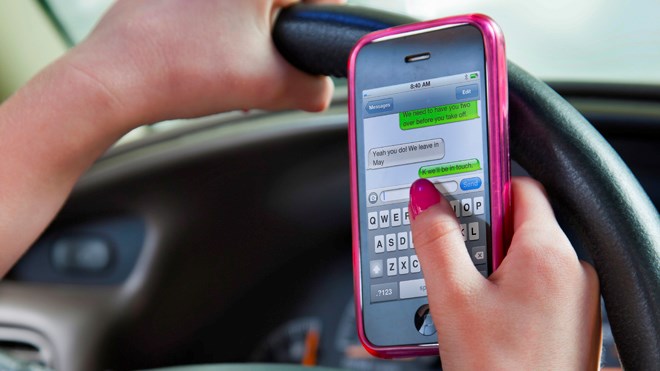If you’re thinking about New Year’s resolutions, now would be a good time to resolve to lock your cellphone out of sight and stop eating when you are driving.
Tough new penalties for distracted driving kick in Jan. 1, 2019, along with an expanded definition of the driving behaviour that statistics show are responsible for one person being injured every half hour in distracted-driving collisions in Ontario.
“There has to be a shift that we all accept, and that’s drinking and driving — the same with drugs and driving — and cellphone and driving should never be combined under any circumstances,” York Regional Police Const. Laura Nicolle said.
Any activity that takes your focus off the road while driving could land you up to a $1,000 fine on your first conviction, a three-day driver’s licence suspension, and three demerit points.
A second and third conviction will see those penalties double up to a $2,000 and $3,000 fine respectively, along with six demerit points, and a seven-day driving suspension on a second conviction within five years and a 30-day suspension for a third and more convictions within five years.
The Transportation Ministry’s new road safety rules were included under the December 2017 provincial government legislation to regulate the sale of recreational cannabis, known as the Cannabis, Smoke-Free Ontario and Road Safety Statute Law Amendment Act.
Not only using a handheld device to talk, text and select a playlist, but also eating, reading and grooming, even while stopped at a red light will land you on the wrong side of the law.
Const. Nicolle said York police have had “some good success” with an initiative launched in August 2016 that had officers riding York Region Transit/Viva buses to get a good view into the vehicles of distracted drivers on the road. It’s not something the police service does every day, but statistics show that officers issue four distracted driving tickets per hour spent on the bus.
Within a five-month timeframe alone, from Jan. 1 to April 5, 2017, York police issued 1,759 tickets for distracted driving compared to 1,041 during the same period in 2016 — a 69 per cent increase.
But when it comes to distracted driving collisions, the statistics are more difficult to pin down, Nicolle said.
“When people say there’s more distracted-driving collisions, what they’re talking about is all levels of distraction,” she said. “If you get into an accident because your coffee spilled on your lap, technically that’s driver distraction, but it doesn’t mean you are charged with using a handheld device. They are two different things and they kind of get melded together. We know that driving a vehicle requires your full attention at all times, and if you’re looking down at a phone trying to send a message, you’re really putting yourself and others at risk.”
Newmarket drivers can expect that throughout the holiday season, impaired and distracted driving will be a priority for York police. A segment on distracted driving is planned for York police's educational social media video series called Driving's Tough Enough.
“The only time you can use your cellphone (in your vehicle) is if you need to call 9-1-1 to report an impaired driver or other emergency,” Nicolle said. “For the people who have been engaging in this and have been lucky enough not to get caught or not get into an accident, count yourself lucky. It’s time to change the driving behaviour and make a major shift, put the phone away.”
From a legal perspective, if your distracted driving causes an accident that results in serious injury, you could be sued by the innocent victim, personal injury lawyers Michael Kelly and Sabrina Singh write in an article on the subject.
“Usually, a conviction for this type of an offence will be considered strong evidence that you are at fault for the accident in any such lawsuit, as well,” the partners say.
Tips to avoid distracted driving, courtesy of Ontario's Transportation Ministry:
- turn off your phone or switch it to silent mode before you get in the car
- put it in the glove compartment (lock it, if you have to) or in a bag on the back seat before you leave the house
- record an outgoing message that tells callers you’re driving and you’ll get back to them when you’re off the road
- some apps can block incoming calls and texts, or send automatic replies to people trying to call or text you
- ask a passenger to take a call or respond to a text for you if you must respond, or if you have to make a call or send a text, carefully pull over to a safe area
- silence notifications that tempt you to check your phone
Penalties for drivers with A to G licences
If you have an A, B, C, D, E, F and/or G licence, starting Jan. 1, 2019 you’ll face:
For your first conviction:
- a fine of up to $1,000
- three demerit points
- a three-day day driver’s licence suspension
For your second conviction within 5 years:
- a fine of up to $2,000
- six demerit points
- a seven-day driver’s licence suspension
For your third and all subsequent convictions within 5 years:
- a fine of up to $3,000
- six demerit points
- a 30-day driver’s licence suspension
Novice drivers
If you hold a G1, G2, M1 or M2 licence, and are convicted of distracted driving, you’ll face the same escalating fines as drivers with A to G licences, but you won’t receive demerit points.
Instead of demerit points you’ll face:
- a 30-day licence suspension for a first conviction
- a 90-day licence suspension for a second conviction
- cancellation of your licence and removal from the Graduated Licensing System (GLS) for a third conviction



